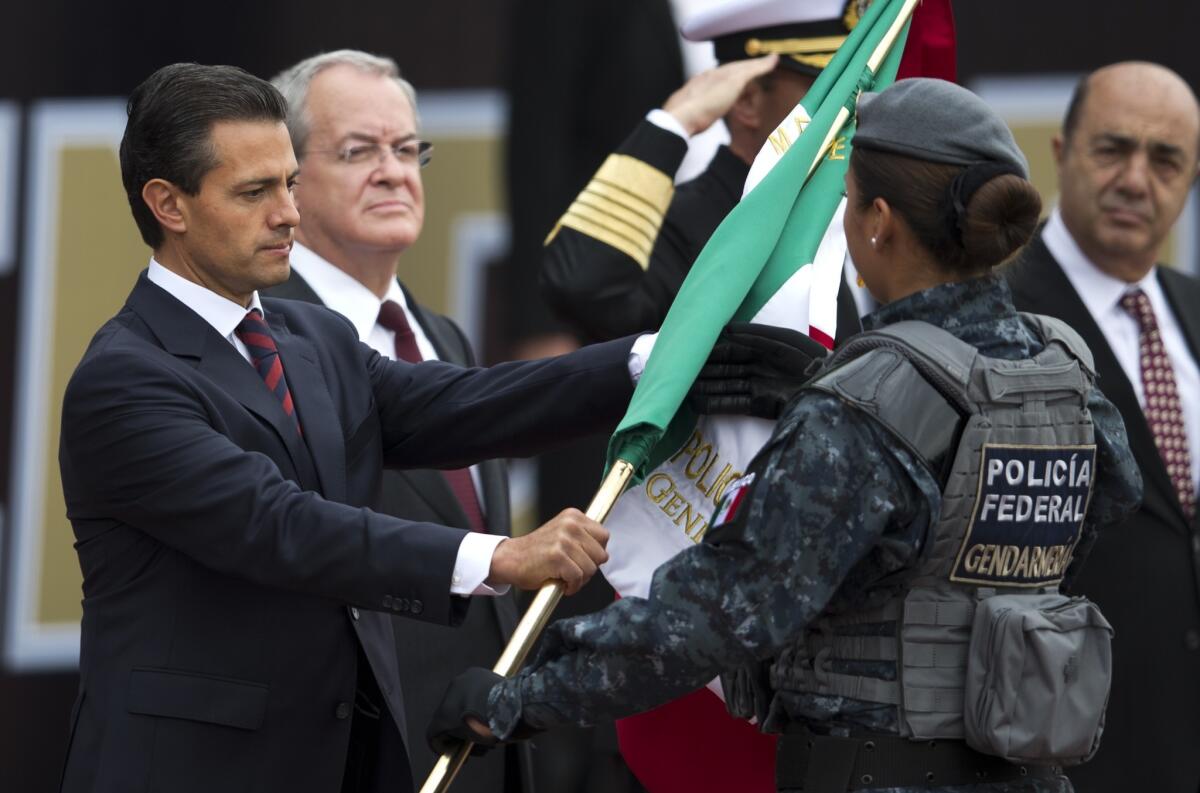Mexico’s Peña Nieto unveils police unit, much smaller than envisioned

- Share via
Reporting from Mexico City — When he was running for election in 2012, Mexican President Enrique Peña Nieto offered a new police organization, the gendarmerie, as a cornerstone campaign promise and his only security initiative. It was to be a 50,000-strong, independent paramilitary force that would tackle Mexico’s toughest crimes.
On Friday, after much delay, Peña Nieto unveiled a much-scaled-back gendarmerie.
It is instead a 5,000-member unit of the federal police that will focus on economic crimes. It will work as a kind of rapid-reaction force, Peña Nieto said, that will be deployed around the country to hot spots as needed. The gendarmerie will be used to protect businesses, tourist areas and harvests of limes, sorghum and other crops, often targeted by drug and crime cartels that extort money from businesspeople and producers with threat of death.
The diminished version of the new corps underscores criticism that Peña Nieto is unable to come up with security strategies that are truly innovative and wants to minimize all discussion of security and violence.
Peña Nieto said the gendarmerie would help restore citizen safety in this violent nation and would be deployed especially where local institutions have been crippled by organized crime, such as the states of Michoacan in the west and Tamaulipas on the border with Texas.
But critics asked how 5,000 more police officers in a country that already has 440,000 — many corrupt or ineffective — will make much of a difference.
Mexico needs better, not more, police officers, said security expert Ernesto Lopez Portillo.
“Once again, the federal government will give us more police,” Lopez Portillo wrote in a column in El Universal newspaper. “History repeats itself, and the obligatory question is why should we expect the results to be different.… The country continues without defining a police model that is modern, professional and democratic.”
Efforts to clean up existing police forces have been slow and spotty. Vetting, much of it paid for by the United States, has been going on for years and, in some towns and cities, entire police forces flunked. National Security Commissioner Monte Alejandro Rubido, however, insisted this week that the process was nearing completion.
Peña Nieto formally installed the gendarmerie in a military-style ceremony at federal police headquarters. There were bands and salutes and speeches. Senior u.s. officials were in attendance.
“The gendarmerie will contribute to the protection of Mexicans, their properties and their source of work when these are threatened by crime,” he said. “It will also help contain and dismantle criminal organization and will be deployed based on greater use of technology and intelligence systems.”
Members selected for the force have not previously served in a police unit and received training from military personnel. Thirteen percent are women.
An analysis published by the CIDAC think tank said the “decaffeinated” version of the gendarmerie presented Friday was “one more patch” on the vast security problems engulfing Mexico.
“The gendarmerie created a lot of expectation at first, but this was diluted as the government turned down the volume on the theme of security,” the analysis said. “Now it seems the creation of this division of the federal police responds more to a campaign promise than to the needs of a security strategy.”
As originally envisioned, the larger gendarmerie would eventually allow the army and navy special forces to return to their barracks. They have been the backbone of the fight against drug cartels since late 2006 because of the perception that police forces were incapable of handling the task and were often on the payroll of the traffickers.
In a separate appearance, Peña Nieto insisted at a security meeting that crime was decreasing in Mexico. He said homicides continued declining in the first seven months of this year, by about 27% from the same period in 2012, with much smaller declines in kidnapping and extortion in the first seven months of this year compared with last year.
However, the government has been accused of manipulating the statistics, and independent organizations, based on their research, say kidnappings and extortions have continued to climb.
Sanchez is a special correspondent.
More to Read
Sign up for Essential California
The most important California stories and recommendations in your inbox every morning.
You may occasionally receive promotional content from the Los Angeles Times.











